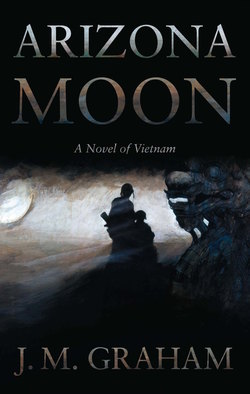Читать книгу Arizona Moon - J.M. Graham - Страница 9
На сайте Литреса книга снята с продажи.
Оглавление2
Nguyen Xian Tho and Pham Long moved ahead of their unit to an outcropping that afforded a view of the valley. The distant explosion and sounds of American helicopters had drawn their attention and sent the other men with them to ground. Pham climbed to a higher vantage point, Nguyen’s binoculars swinging precariously from his neck. Nguyen had threatened to make Pham’s life very difficult if he allowed any harm to come to them. Pham concentrated on his hand- and footholds, blocking out his leader’s voice. From the ledge he could see over the jungle canopy in the valley, and he trained the binoculars on the smoke rising in the distance. “May bay truc thang, hai,” he said, indicating that there were helicopters in the valley, two of them.
“Boa xa?” Nguyen asked. How far?
Pham watched one of the helicopters make lazy circles in the distance. “Hai kilometers,” he said, rocking his hand back and forth to indicate the distance was only a rough estimate. He watched until the second helicopter rose from the jungle and continued watching as the two flew east until their sound faded to nothing. “Thuy quan luc chien my,” he said, looking down into Nguyen’s upturned face. Nguyen shrugged and waved him down. So the American Marines were in the valley. It was no concern of his. He had his orders. He was to avoid contact with enemy units and deliver his cargo to cadres in the Quang Nams before the Lunar New Year for the Tet celebration.
Pham climbed down and returned the binoculars to Nguyen, who inspected them thoroughly before replacing them in the canvas case hanging around his neck. Hanoi had made it sound like his new assignment was a promotion to unit commander, but Nguyen felt like he’d been demoted to laborer. He was being sent down Uncle Ho’s trail again, but this time as a coolie.
Before starting south, Nguyen’s men exchanged their North Vietnamese Army uniforms for the oa baba that U.S. troops described as black pajamas. Some wore sandals made from old tire treads, and soft, wide-brimmed hats took the place of their usual pith helmets.
Nguyen and Pham backtracked to where they had dropped their equipment. Pack boards strapped with RPGs and mortar rounds lay next to a recoilless rifle and a Chinese 24 machine gun. Stretched out along the mountainside, the members of the NVA unit were already getting to their feet and hauling the heavy weapons up onto their backs. Co Chien and Sau Thao lifted the bulky machine gun strapped to two long bamboo poles that flexed under its weight. Truong Nghi, another student volunteer like Pham, followed with the gun’s tripod balanced on his shoulders.
Pham helped Nguyen with his pack board of mortar rounds before swinging a mortar tube onto his own shoulder. “Couldn’t we move faster if we went down to level ground?” he asked.
Nguyen ran a belt through his shoulder straps and cinched it tight across his chest. “The valley is heavily mined. We could move faster, but at what cost? I will not take the chance without a local guide. Even this high we are not safe, so step with care. And as you saw, the Americans are inside the trees, and we must move away from them.” Nguyen leaned into his load and started off.
They had come more than forty kilometers from the Laotian border in the last five days, and their burdens were wearing them down. Their backs felt broken and their shoulders were rubbed raw. Each day they appreciated the time spent resting more than the day before. They originally pushed on through the rain, but their progress was so slow and the falls so frequent that it was decided that waiting out the downpours was wiser than losing a man to injury. Anyway, they had time.
“It’s good to know our leader is concerned for our safety,” Truong said, coming alongside Pham.
“Don’t be a fool, Truong. His concern is for the cargo.”
Truong moved close to Sau so he could speak unheard. “Is it true that the Americans call this area Arizona?”
Sau turned his head, trying to keep pace with Co so he wouldn’t push or be pulled. “I’ve heard Nguyen say so.”
“Why would they do that? I’ve read about their Arizona. How could this place remind them of it?”
Sau tried to shrug. “I don’t know, Truong. The Americans think they are cowboys, so maybe they also think there are Indians here.”
Truong dropped back a few paces, giving the concept some consideration. “I think they’re right about that,” he said. “There are Indians here. And we are the Indians.” As an avid reader of western novels published in America, he felt happy somehow to be saying that. He suddenly experienced a surge of pride. In all his readings, he had never identified with the cowboys in the stories he loved so much, even though they were the main characters and obviously the intended heroes. He always thought of himself as one of the Indians.
